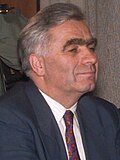| Portrait | Name
(Birth–Death) | Term of office | Political party | Election |
|---|
| Took office | Left office | Time in office |
|---|
| 1 |  | Momčilo Krajišnik
(1945–2020) | 5 October 1996 | 13 October 1998 | 2 years, 8 days | SDS | 1996 – 690,646 votes (67.30%) |
|---|
| 2 |  | Živko Radišić
(1937–2021) | 13 October 1998 | 28 October 2002 | 4 years, 15 days | SP | 1998 – 359,937 votes (51.31%) |
|---|
| 3 |  | Mirko Šarović
(born 1956) | 28 October 2002 | 2 April 2003 | 156 days | SDS | 2002 – 180,212 votes (35.52%) |
|---|
| 4 |  | Borislav Paravac
(born 1943) | 10 April 2003 | 6 November 2006 | 3 years, 210 days | SDS | – |
|---|
| 5 |  | Nebojša Radmanović
(born 1949) | 6 November 2006 | 17 November 2014 | 8 years, 11 days | SNSD | 2006 – 287,675 votes (53.30%)
2010 – 295,629 votes (48.92%) |
|---|
| 6 |  | Mladen Ivanić
(born 1958) | 17 November 2014 | 20 November 2018 | 4 years, 3 days | PDP | 2014 – 318,196 votes (48.71%) |
|---|
| 7 |  | Milorad Dodik
(born 1959) | 20 November 2018 | 15 November 2022 | 3 years, 360 days | SNSD | 2018 – 368,210 votes (53.88%) |
|---|
| 8 |  | Željka Cvijanović
(born 1967) | 16 November 2022 | Incumbent | 3 years, 33 days | SNSD | 2022 – 327,720 votes (51.65%) |
|---|
























